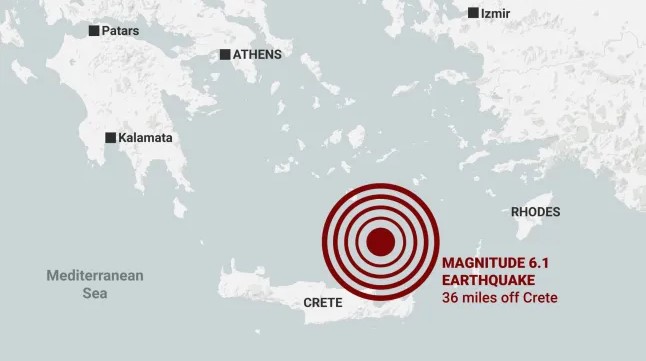
For many women over 50, solo travel offers a chance to explore the world with freedom and confidence. But even the best-laid travel plans can be shaken—literally—by natural disasters. If you’re visiting an earthquake-prone destination like Greece, it’s vital to know how to stay safe and prepared.
This solo female travel guide covers what to do before, during, and after an earthquake, with tips on staying informed, protecting yourself, and navigating insurance options. Whether you’re island-hopping in the Cyclades or exploring Crete, these earthquake safety tips for women travelling solo could make all the difference.
Is Greece Safe for Solo Female Travellers During Earthquake Season?
Greece is one of Europe’s most seismically active countries, sitting at the meeting point of the Eurasian and African tectonic plates. Recent activity near Crete—including a 6.1 magnitude quake—has triggered temporary tsunami warnings and heightened public safety measures.
But don’t panic. While earthquakes are a risk, many solo travellers safely enjoy Greece each year. The key is preparation.
Earthquake Safety Tips for Solo Female Travellers
1. Know the Risk Zones
Before booking, check the UK Foreign Office travel advice for the country or region you’re visiting. Areas such as Santorini, Crete, Rhodes, Amorgos and Ios are known for higher seismic activity.
2. Sign Up for Emergency Alerts
Stay informed by enabling emergency notifications on your smartphone:
iPhone: Settings > Notifications > enable ‘Emergency Alerts’
Android (v11+): Settings > Notifications > Advanced > Wireless Emergency Alerts
Samsung: Settings > Apps > Messages > Notifications > Emergency Notifications
Greece’s alert system sends warnings in English, which is ideal for solo travellers unfamiliar with the language.
What to Do During an Earthquake While Travelling Alone
If an earthquake hits, follow these crucial steps:
🌍 Indoors
Drop, Cover, and Hold: Get under a sturdy table or desk. Hold onto it until the shaking stops.
Avoid windows and large furniture that could fall.
Don’t use balconies, lifts, or attempt to run outside mid-quake.
🏙️ In High-Rises or Public Spaces
Move away from glass or decorative walls.
In shopping centres or museums, avoid panic and stay where you are until it’s safe.
🌳 Outdoors
Head for an open space, away from buildings and power lines.
Cover your head with a scarf or bag to protect from debris.
🚗 In a Car
Pull over to a safe open area, away from bridges and tunnels.
Stay inside the vehicle until the shaking stops.
What to Do After an Earthquake
Expect aftershocks. Stay alert.
If you’re in a building, leave via the stairs, not the lift.
Turn off gas, electricity, and water if safe to do so.
Avoid driving unless absolutely necessary to keep roads clear for emergency services.
Use mobile phones only for emergencies to prevent network congestion.
Head to open spaces and listen for updates via radio or official alerts.
In Case of a Tsunami Warning
If you’re in a coastal area and notice the sea rapidly receding or rising:
Move away from the shoreline immediately.
Head for higher ground.
Do not go to the beach to film or watch the waves. If you see a tsunami, it’s too late to outrun it.
Travel Insurance for Natural Disasters: What Solo Travellers Should Know
Not all travel insurance policies include natural disaster cover as standard. Here’s what to keep in mind:
✔️ Before You Travel
Choose a policy that specifically covers earthquakes and tsunamis.
Read the small print to understand what’s included, especially if you change your travel plans due to an earthquake.
🧳 If Disaster Strikes During Your Trip
Contact your holiday provider to discuss refunds or alternative arrangements.
If you paid by credit card, ask your bank about chargeback claims.
Your travel insurance may cover delays, extra accommodation, or emergency flights home—but only if you’re following Foreign Office advice.
⛔ Invalid Claims
Travelling against FCDO warnings could invalidate your insurance. Always check for updates before departing.
Staying Safe as a Solo Female Traveller in Greece
Despite its seismic activity, Greece remains a popular and relatively safe destination for women travelling alone over 50. By staying informed and prepared, you can confidently explore this beautiful country—even in the face of unexpected events.
Final Tips:
Keep essentials like passports, medication, water, snacks, and a power bank in one place in case you need to evacuate quickly.
Let family or friends in the UK know your location and itinerary.
Stay connected with your hotel staff, tour operators, and official news sources.
